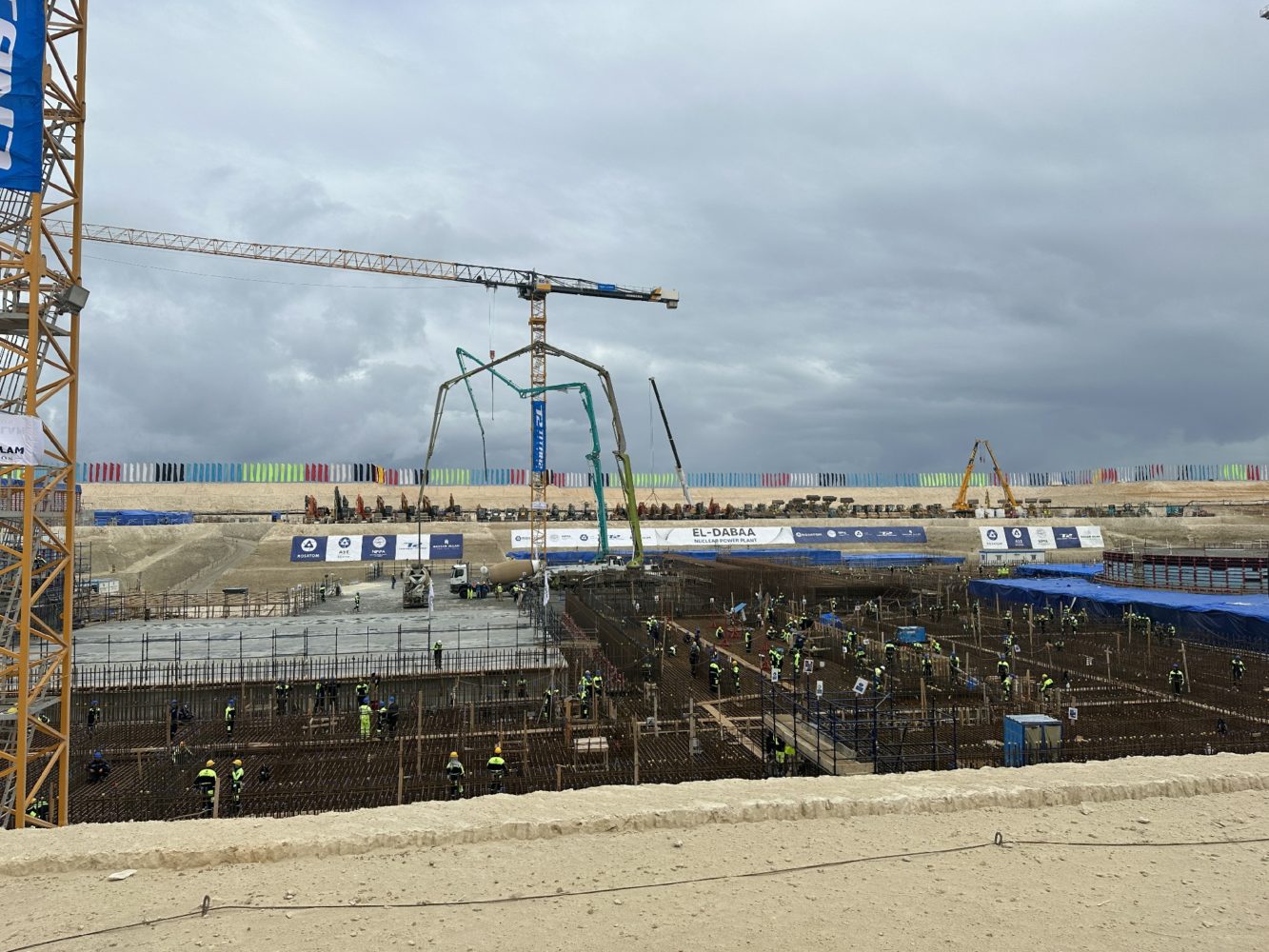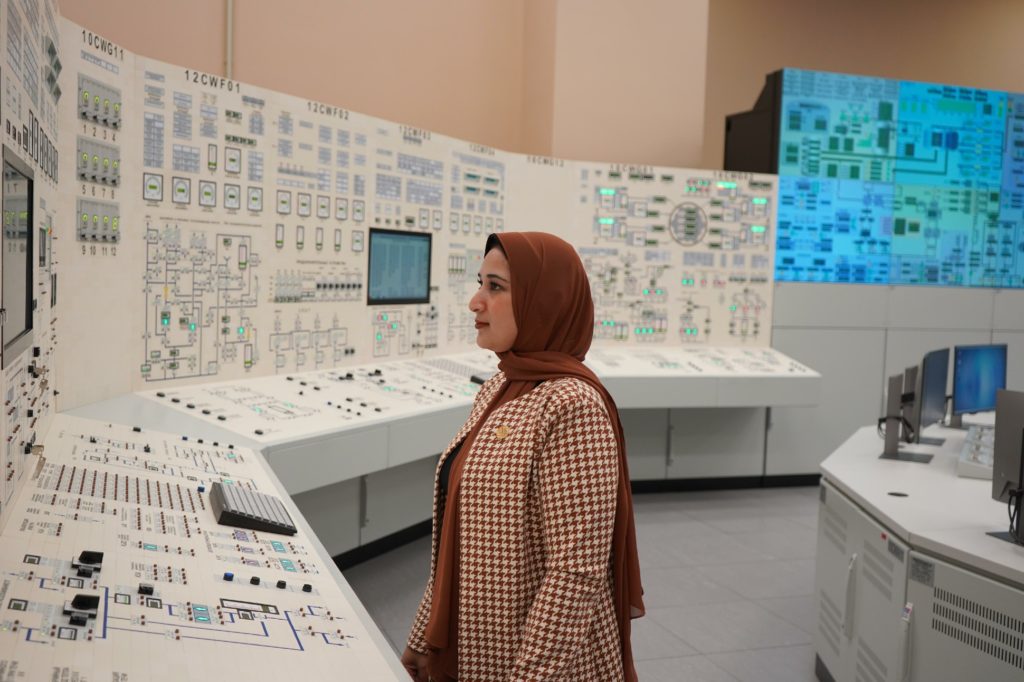
First In Spotlight
back to contentsConstruction of the nuclear power plant at El Dabaa is progressing swiftly as the core catcher, one of the plant’s key passive safety devices, was delivered to the construction site. In June, a Hungarian delegation visited the site to learn from the experience of their Egyptian colleagues. The work is continuing to train staff for the soon-to-be-built nuclear facility.
In early July, a molten core catcher, or melt trap, for Unit 3 was delivered to the construction site of Egypt’s El Dabaa Nuclear Power Plant. The delivery from the Russian port of Novorossiysk took only six days. The total weight of the cargo exceeded 480 tonnes, while the complete core catcher alone weighs about 150 tonnes.
According to ASE Vice President and El Dabaa Construction Project Director Alexey Kononenko, the construction project makes a large step forward with each piece of long-lead equipment arriving at the site. “With support from the project owner, the Nuclear Power Plants Authority of Egypt, we delivered the core catcher ahead of schedule. Its installation at the site of Unit 3 will begin as soon as October,” Alexey Kononenko said.
Designed by Russian engineers, the core catcher is part of the passive safety system intended to prevent radioactive substances from being released into the environment in the event of a severe accident. It is a steel vessel that retains corium fragments and prevents them from escaping out of the containment area. The core catcher contains the so-called sacrificial material, a mixture of special cements, aluminum oxide, gadolinium and other substances, that ensures the uniform distribution of corium inside the ‘melt trap’ and blocks the chain reaction. The core catcher can hold hundreds of tonnes of corium for long periods of time.
“Experts from the Nuclear Power Plants Authority took part in inspections of the long-lead equipment production facilities in Russia to ensure that safety and quality standards are met and the design requirements are fulfilled,” said Eng. Mohamed Ramadan Badawi, General Manager for El Dabaa Project at Egypt’s Nuclear Power Plants Authority.
The experience gained at the construction of Egypt’s advanced nuclear station is important for the other countries of the global nuclear club. In late June, a delegation headed by Gergely Jákli, Chairman and CEO of Paks II NPP (Hungary), visited the construction site at El Dabaa. The guests were shown the progress of construction works as they were inspecting the main site, shoreline structures, and residential quarters for employees.

“The visit of Hungarian colleagues is, first of all, an opportunity for us to share experience, ideas and technology,” Alexey Kononenko said.
Hungary operates the Paks Nuclear Power Plant with four VVER‑440 reactors built to the Soviet design. Paks generates over 50 % of electricity produced in Hungary. In 2023, Rosatom started construction of two new units with VVER‑1200 reactors (Paks II). Their guaranteed service life is 60 years.
“We are open to sharing with the Paks II team our experience in the construction of a nuclear station with VVER‑1200 reactors and hope to learn more from the country that has been operating its nuclear power plant for many decades,” Mohamed Ramadan Badawi said.
Personnel training
Training staff for the soon-to-be-built nuclear plant is a critical aspect of the El Dabaa project. This is another area where Rosatom maintains close ties with Egypt.
In mid-June, Tatyana Terentyeva, Deputy Director General for HR at Rosatom, met with Mohamed Ayman Ashour, Minister of Higher Education and Scientific Research of Egypt. They discussed the possibility of establishing branches of Russian technical universities at the Borg El Arab Technological University in Alexandria to train Egyptian engineers, including those for El Dabaa NPP.
Mohamed Ayman Ashour recalled that he had received a postgraduate degree from the Moscow Institute of Architecture. The minister noted the high level of Russian education and emphasized the country’s readiness to expand cooperation in higher education. “Opening branches of Russian universities will lay a foundation for the training of highly qualified professionals for both Egypt and other countries in Africa and the Middle East,” he said.
According to Tatyana Terentyeva, civil nuclear programs launched by Rosatom’s partner countries ensure their technological sovereignty, which is impossible without trained personnel. “Along with training staff for the nuclear facility being built in the country, another no less important goal is to establish a nuclear education system in the partner country to ensure the sustainable development of the national nuclear industry in the future. Our integrated approach to training personnel for nuclear plants in partner countries has proven effective in Turkey and Bangladesh, and we are ready to pass on our experience to our Egyptian colleagues,” Tatyana Terentyeva emphasized.
The meeting resulted in a decision to establish a joint cross-department working group on personnel training to include all the stakeholders.




